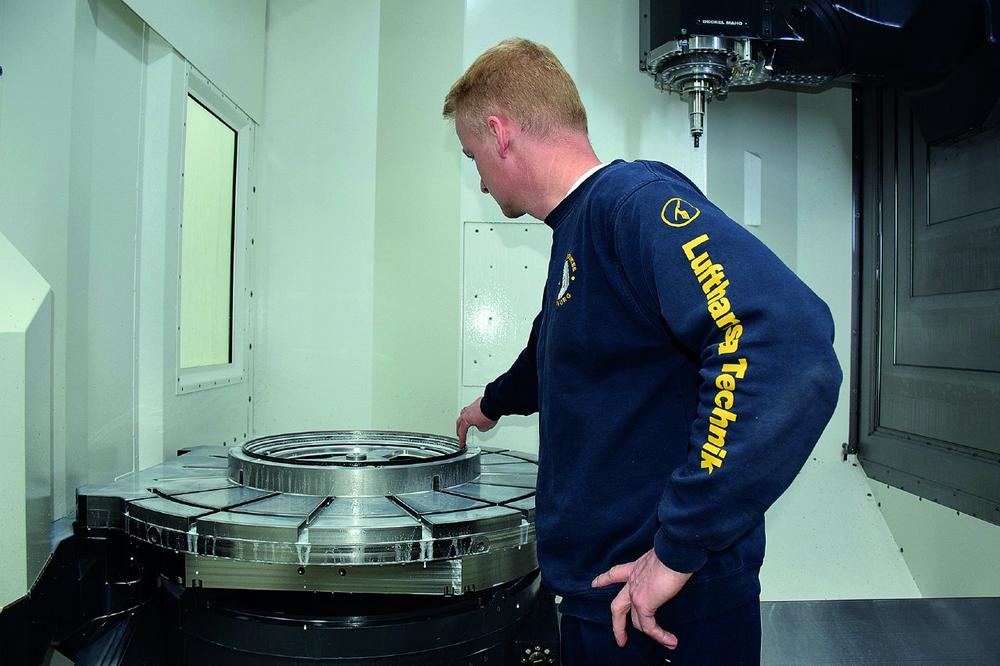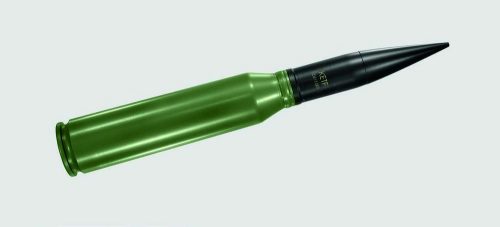
powRgrip clamping system from Rego-Fix in aviation repair
Repairing components of aircraft makes particular demands upon the companies involved. On the one hand, customers – the world’s airlines – expect maximum flexibility and the shortest possible delivery periods. On the other, the repair tasks must be carried out with extreme precision, reliability, and process stability.
Difficult-to-machine materials
These demands are predominantly confronted by manufacturing companies which repair worn jet engines. Alongside components made from aluminium alloys, this primarily involves drilling, milling, and tapping workpieces made from tough, heat-resistant materials such as nickel-based alloys or titanium. For example, the worn housing and turbine blades are first built up on the contours in question, using a plasma process. Then the components are milled, drilled and tapped on machining centres, in order to restore the geometries in accordance with the original data. This demands maximum reliability, precision, and above all flexibility. Different drilling, milling, and tapping tools are reliably clamped with a high level of concentric accuracy, in quick succession. Only in this way is it possible to reliably maintain the required accuracy on the workpieces of ≤ 0.01 mm. Precise concentricity also contributes, especially when machining hard materials, to long tool life and therefore to cost-effective use of these high-quality tools. Any damage to these expensive components (which as one-off pieces cannot – at least not in the short term – be replaced) due to improperly clamped tools must be altogether avoided.
Automatically pressed-in collets
After conducting an in-depth comparison of different tool-clamping systems, a German aviation maintenance company has opted for the powRgrip clamping system from Rego-Fix AG in Tenniken (Switzerland). Those responsible for the decision confirm that it satisfies all the demands of the aviation industry. Tools with a diameter of 3 to 32 mm can be reliably clamped to a repeat concentric accuracy of 3 µm in no time. To achieve this, the clamping system uses special collets with no clamping nut. They are simply pressed into the toolholders by hydraulic force. With the PGU 9500 automatic clamping unit this occurs reliably and flawlessly, even with no special knowledge on the part of the operator. Based on the toolholder and adapter, the clamping unit automatically detects the required clamping forces for the powRgrip collets. This makes the clamping process extremely reliable and independent from the skill of the operator. Furthermore, it takes only 15 seconds. As reported by the aviation maintenance technician, a tool change is significantly faster and more flexible than with the shrink chuck which would otherwise be used. Including heating and cooling times, this would require up to 15 minutes for the tool change. On hydraulic chucks, the aviation maintenance technician finds the reliability and process stability to be lacking. During extended idle periods, the pressure in the clamping chuck can drop uncontrollably, which means that the retaining force for the tool is not available. With the mechanically pressed-in collets of the powRgrip clamping system, on the other hand, the technician from the maintenance company reports that a constant retaining force is permanently guaranteed, regardless of the length of the idle period and the use of the tool. Moreover, the double press fit of the collets between the toolholders and tool shafts ensures extraordinarily high damping. In addition to the precise concentricity, this contributes to long tool life. The aviation engineers benefit from these advantages on all VHM and HSS tools with cylindrical shanks, with tolerance h6 as well as h9 in the diameter. This means that the aviation maintenance engineer is able to pick up all of the tools which they have in circulation, including the thread tap, with the same clamping system. Thus they achieve high levels of process stability, while also simplifying tool logistics and substantially reducing costs.
The comprehensive Rego-Fix range offers all of the standard toolholders for the powRgrip clamping system. These include HSK, SK, BT, polygon (Capto), and ISO20 (specially for Haas machining centres). In addition to standard collets, PG6 to PG32, special versions for tapping and with integrated axial coolant supply are available.
About Rego-Fix
Rego-Fix is a globally-active, second-generation family business with more than 200 employees, and produces and sells high precision tool clamping systems. The company’s headquarters is in Tenniken in Switzerland; it is considered one of the world’s leading manufacturers of tool clamping systems and has a global reputation in the metal machining industry. Through its global sales partner network, with locations in Switzerland, the USA and Asia, Rego-Fix is in the best position and can be found all around the world. With its pioneering product inventions, Rego-Fix has grown from a small company into a global solutions provider for tool clamping systems. Each product is developed with the aim of increasing productivity and produced with Swiss quality. Rego-Fix products are particularly popular in the vehicle and aircraft construction, mould construction, machine construction, medical technology and watchmaking sectors.
An der Erfolg versprechenden Aufbruchsstimmung der 50er-Jahre steckt sich der Werkzeugmeister Fritz Weber an und gründet das Kleinunternehmen Fritz Weber Feinmechanik und Werkzeugbau. Mit Innovationsgeist und Entschlossenheit erweitert Fritz Weber die Produktpalette kontinuierlich. Im Jahr 1972 optimierte er die bis dahin bekannte E-Spannzange. Er bezeichnete seine Variante als ER-Spannzange mit dem R als Synonym für Rego-Fix. Mit seinen Innovationen beeinflusst Weber massgeblich den Fortgang der Werkzeugspanntechnik und wird weltweit berühmt. Im Jahr 1993 nimmt der Normenausschuss die ER-Spannzange als deutsche Industrienorm (DIN 6499) auf. Danach entwickelt sich die Bezeichnung ER-Spannzange zum Gattungsbegriff für das weltweit meistverkaufte Spannsystem für Werkzeuge.
Rego-Fix produziert und vertreibt als international tätiges Familienunternehmen in zweiter Generation mit über 220 Mitarbeiterinnen und Mitarbeitern hoch präzise Werkzeugspannsysteme. Heute zählt das Unternehmen mit Firmensitz im Schweizer Tenniken zu den führenden Herstellern von Werkzeugspannsystemen und geniesst in der metallverarbeitenden Industrie weltweites Ansehen. Denn durch das globale Vertriebspartnernetz, mit Standorten in der Schweiz, den USA und in Asien, ist Rego-Fix optimal aufgestellt sowie auf der ganzen Welt präsent. Mit wegweisenden Produkterfindungen hat sich Rego-Fix vom Kleinunternehmen zum weltweiten Lösungsanbieter für Werkzeugspannsysteme entwickelt. Jedes Produkt wird unter dem Aspekt der Produktivitätssteigerung entwickelt und mit Schweizer Qualität produziert. Die Rego-Fix-Produkte finden sich insbesondere in den Bereichen Fahrzeug- und Flugzeugbau, Formenbau, Maschinenbau, Medizintechnik und Uhrenherstellung wieder.
REGO-FIX AG
Obermattweg 60
CH4456 Tenniken
Telefon: +41 (61) 976-1466
Telefax: +41 (61) 976-1414
http://www.rego-fix.ch
E-Mail: vtozzo@rego-fix.com
![]()



